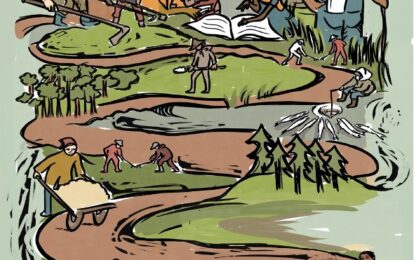ORFC 2026 8 – 9 Jan
ORFC 2026 8 – 9 Jan
Other species are an essential workforce in the ongoing regulation of the Earth's global climate and regional weather systems. Plants, microbes, fungi, insects, and animals all have a role to play in local and global temperature regulation, cloud formation, rainfall, wind patterns, and the prevention of flooding, drought, and wildfires. Humans have overlooked this workforce in our historical land management, which has intensified climate change and its local effects. It's time to recognize that we…
Over the long arc of history, humans have eaten extraordinarily diverse diets: thousands of varieties of cultivated crops and wild foods. There is a rich bank of human and culinary history, as well as an important resource for food security and climate resilience, in the world’s rarest foods: from wild honey harvested by the Hadza in Tanzania to windswept wheat on Orkney. These foods could hold the key to our food future, but they are…
A presentation of the process of preparing a sample and a practical view of what can be seen in a microbially rich compost. We'll be sharing our experience of 40 plus compost piles and how it relates to your soil. During the session we will demonstrate how to prepare a microscopy slide for viewing and will run through many fields of view in search of fungi, bacteria, protozoa and nematodes. We will bring samples of…
This session is a journey of stories told by four farmers about what land means to them and how they are fighting to defend their right to it. They will show why land is common, not a commodity, and people, not corporations, must be able to enjoy it.

Farms don’t just grow food, they grow opportunity. Research shows that communities surrounded by small farms benefit economically, as small farms circulate income among local establishments and generate jobs. The Hutson-Kadara family is using the power of farming to create opportunities for their town. Allensworth - located in California’s Central Valley - is a small, rural town whose promising trajectory as a Black agricultural haven was dashed by racism in the early 1900s. Today, the…
Building on the successful launch of the Sustainable Food Trust’s Feeding Britain from the Ground Up report in June, this session will explore the need to speed up the transition to more resilient and regenerative food and farming systems and reduce public confusion about healthy and sustainable diets. The panel will focus on how we can align what we eat with the output of genuinely sustainable farming systems, and explore what’s needed to enable this…

From silver back pumpkin in Hertfordshire to some of the world’s hottest chilli varieties in Dorset, this session will explore growing and marketing crops not usually found in the British context. Head grower at Woodoaks Farm, Rickey has ambitious plans to grow exotic fruit, amaranth, silver back pumpkin, mushrooms and micro greens. His Caribbean heritage and journey through different growing systems has given him interesting insight on what works. We will also hear from Woodoaks…

In a time of multiple food system and societal crises, progressive actors can see years of hard work campaigning, piloting new systems, and researching new policy solutions wiped out instantaneously. Reactionary politics is driving the abandonment and obstruction of long-term planning, in favour of further transfers of wealth to corporate interests. In the meantime, structural problems baked into our food system, and the resulting harms to human and environmental health, continue to exacerbate. Join Feedback…
During this session we will dive into the littoral zone to cover algae 101. We will learn about wild algae forests, the evolutionary history of micro-algae, about the algae blooms caused by nitrogen/phosphorus loading of waterways, about algae as a fertiliser, algae carbon speculation and algae-industrialization for biofuels. We will share information on the global supply chains and seaweed workers, and the concerns about how these production methods will fare in a changing climate. We…